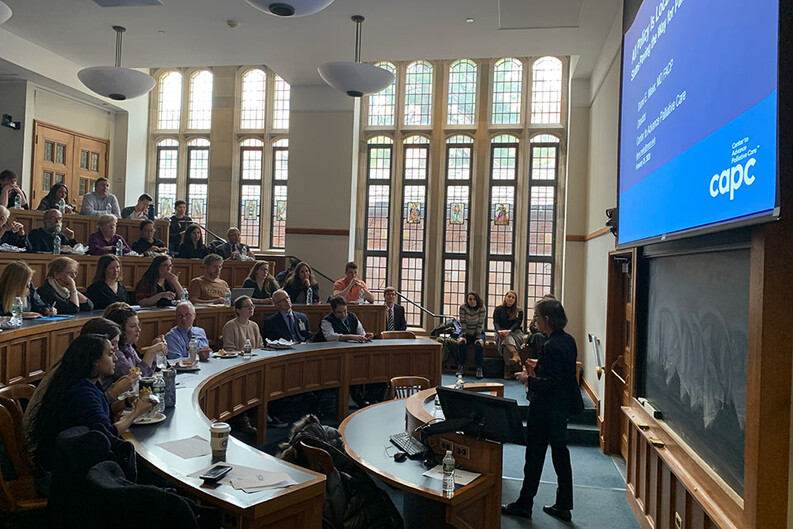Palliative Care Pioneer Dr. Diane Meier Speaks at YLS

On February 25, 2020, the Solomon Center for Health Law and Policy hosted Dr. Diane Meier, a leading national expert on palliative care, for her presentation “All Health Policy is Local: States Paving the Way for Palliative Care.”
Meier spoke to a standing-room-only crowd of health care providers, legal professionals, community members, and students about the importance of palliative care for patients and the health system, and the landscape of palliative care across the country. Meier opened by discussing the disconnect she has noticed between the world of doctoring at the bedside and the world of policymaking.
Palliative care, Meier described, is specialized medical care for people with serious illness and their families. It focuses on quality of life, employs an interdisciplinary team, and is an added layer of support to traditional medicines. It is appropriate for any age, diagnosis, and at any stage of disease when provided with other treatments. Meier reported that there is abundant data that palliative care is successful in improving quality of life and other health outcomes.
To illustrate the importance of palliative care and policy solutions, Meier presented the story of a patient, Mr. B., whom she met years ago on his third ER visit in two months. At the time, Mr. B was an 88-year-old man with mild cognitive impairment, back pain from prostate cancer, and bad arthritis. He was also taking too much Tylenol, and it was not alleviating his pain. The attending physician in the ER was exasperated that Mr. B and his wife were “abusing the emergency room.” But, Meier pointed out, this was a policy problem, not a patient problem: without the support systems that palliative care would later activate for the couple, Mrs. B would call the doctor’s office when Mr. B’s pain became unbearable; this would often be in the evening, and the answering machine recording would instruct her to call 911.
Meier treated the patient effectively in the hospital with small amounts of opioids that the other doctors didn’t feel comfortable using. She then personally called the director of the hospital’s palliative care program and worked with the program director to put Mr. B. ahead of a 3-4 month wait list — another policy issue, she explained. The hospital’s palliative care program operated on a house-call model, and during the first house call the team spotted significant and easily remedied issues: slippery throw rugs, exposed wires, a lack of hand-grabs in the bathroom, and food insecurity. The team was able to fix many of these problems through a home redesign. They also reconnected the couple with important support systems: Meals on Wheels, the friendly visitor program at their local church, and the couple’s out-of-state daughter who hadn’t known the extent of her parents’ troubles. Meier reported happily that seven years later Mr. and Mrs. B are still living at home and haven’t had any 911 calls or ER visits since.
This powerful story highlighted many health care flaws that could be solved by policy change. According to Meier, the kind of care that Mr. B. received before she stepped in with her knowledge and connections is the kind of care that is easier to get, supported by current policy and funding. However, this care clearly doesn’t provide the solution provided by the wrap-around approach of palliative care. Meier also addressed the myth that money is overspent on people at the end of life that results from a misunderstanding of data. It is not the diagnosis that drives up spending, rather it is the other aspects of the patients’ lives that do so, and those are what should be targeted.
The remainder of Meier’s discussion explored efforts and options to promote palliative care and policy solutions. Meier directs the Center to Advance Palliative Care (CAPC), which is employing a number of tools to encourage palliative care programs across the country. One such tool is a state report card, used to leverage the peer pressure across state leadership. Meier also emphasized the ability of states as purchasers to pressure change, and the regulatory power that states already have and employ in the healthcare sphere. State policy change is especially important in the face of hefty barriers at the federal level: the deficit, an anti-regulatory environment, “death panel” mischaracterizations, and Senate gridlock. In closing, Meier encouraged the audience to consider how access to palliative care can be improved through policy changes on payment or regulation, and how state-based coalitions can work towards better policy on access to and quality of palliative care.


